This past week I had the honor of speaking at FOSSC Oman 2015 in Muscat, following an invitation last fall from Professor Hadj Bourdoucen and the organizing team. Prior to my trip I was able to meet up with 2013 speaker Cat Allman who gave me invaluable tips about visiting the country, but above all made me really excited to visit the middle east for the first time and meet the extraordinary people putting on the conference.
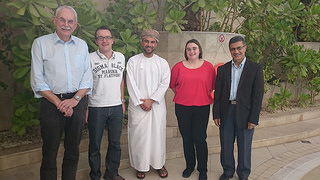
Some of the speakers and organizers meet on Tuesday, from left: Wolfgang F. Finke, Matthias Stürmer, Khalil Al Maawali, me and Hadj Bourdoucen
My first observation was that the conference staff really went out of their way to be welcoming to all the speakers, welcoming us at the hotel the day before the conference, making sure all our needs were met. My second was that the conference was that it was really well planned and funded. They did a wonderful job finding a diverse speaker list (both topic and gender-wise) from around the world. I was really happy to learn that the conference was also quite open and free to attend, so there were participants from other nearby companies, universities and colleges. I’ll also note that there were more women at this conference than I’ve ever seen at an open source conference, at least half the audience, perhaps slightly more.
The conference itself began on Wednesday morning with several introductions and welcome speeches from officials of Sultan Qaboos University (SQU), the Information Technology Authority (ITA) and Professor Hadj Bourdoucen who gave the opening FOSSC 2015 speech. These introductions were all in Arabic and we were all given headsets for live translations into English.
The first formal talk of the conference was Patrick Sinz on “FOSS as a motor for entrepreneurship and job creation.” In this talk he really spoke to the heart of why the trend has been leaning toward open source, with companies tired of being beholden to vendors for features, being surprised by changes in contracts, and the general freedom of not needing “permission” to alter the software that’s running your business, or your country. After a break, his talk was followed by one by Jan Wildeboer titled “Open is default.” He covered a lot in his talk, first talking about how 80% of most software stacks can easily be shared between companies without harming any competitive advantage, since everyone needs all the basics of hardware interaction, basic user interaction and more, thus making use of open source for this 80% an obvious choice. He also talked about open standards and how important it is to innovation that they exist. While on the topic of innovation he noted that instead of trying to make copies of proprietary offerings, open source is now leading innovation in many areas of technology, and has been for the past 5 years.
My talk came up right after Jan’s, and with a topic of “Building a Career in FOSS” it nicely worked into things that Patrick and Jan had just said before me. In this world of companies who need developers for features and where they’re paying good money for deployment of open source, there are a lot of jobs cropping up in the open source space. My talk gave a tour of some of the types of reasons one may contribute (aside from money, there’s passion for openness, recognition, and opportunity to work with contributors from around the world), types of ways to get involved (aside from programming, people are paid for deployments, documentation, support and more) and companies to aim for when looking to find a job working on open source (fully open source, open source core, open source division of a larger company). Slides from my talk are available here (pdf).
Directly following my talk, I participated in a panel with Patrick, Jan and Matthias (who I’d met the previous day) where we talked about some more general issues in the open source career space, including how language barriers can impact contributions, how the high profile open source security issues of 2014 have impacted the industry and some of the biggest mistakes developers make regarding software licenses.
The afternoon began with a talk by Hassan Al-Lawati on the “FOSS Initiative in Oman, Facts and Challenges” where he outlined the work they’ve been doing in their multi-year plan to promote the use and adoption of FOSS inside of Oman. Initiatives began with awareness campaigns to familiarize people with the idea of open source software, development of training material and programs, in addition to existing certificate programs in the industry, and the deployment of Open Source Labs where classes on and development of open source can be promoted. He talked about some of the further future plans including more advanced training. He wrapped up his talk by discussing some of the challenges, including continued fears about open source by established technologists and IT managers working with proprietary software and in general less historical demand for using open source solutions. Flavia Marzano spoke next on “The role and opportunities of FOSS in Public Administrations” where she drew upon her 15 years of experience working in the public sector in Italy to promote open source solutions. Her core points centered around the importance of the releasing of data by governments in open formats and the value of laws that make government organizations consider FOSS solutions, if not compel them. She also stressed that business leaders need to understand the value of using open source software, even if they themselves aren’t the ones who will get the read the source code, it’s important that someone in your organization can. Afternoon sessions wrapped up with a panel on open source in government, which talked about how cost is often not a motivator and that much of the work with governments is not a technical issue, but a political one.
The conference wrapped up with lunch around 2:30PM and then we all headed back to our hotels before an evening out, which I’ll talk more about in an upcoming post about my tourist fun in Muscat.
Thursday began a bit earlier than Wednesday, with the bus picking us up at the hotel at 7:45AM and first talks beginning at 8:30AM.
Matthias Stürmer kicked off the day with a talk on “Digital sustainability of open source communities” where he outlined characteristics of healthy open source communities. He first talked about the characteristics that defined digital sustainability, including transparency and lack of legal or policy restrictions. The characteristics of healthy open source communities included:
- Good governance
- Heterogeneous community (various motivations, organizations involved)
- Nonprofit foundation (doing marketing)
- Ecosystem of commercial service providers
- Opportunity for users to get things done
It was a really valuable presentation, and his observations were similar to mine when it comes to healthy communities, particularly as they grow. His slides are pretty thorough with main points clearly defined and are up on slideshare here.
After his presentation, several of us speakers were whisked off to have a meeting with the Vice-chancellor of SQU to talk about some of the work that’s been done locally to promote open source education, adoption and training. Can’t say I was particularly useful at this session, lacking experience with formal public sector migration plans, but it was certainly interesting for me to participate in.
I then met up with Khalil for another adventure, over to Middle East College to give a short open source presentation to students in an introductory Linux class. The class met in one of the beautiful Open Source Labs that Hassan had mentioned in his talk, it was a real delight to go to one. It was also fascinating to see that the vast majority of the class was made up of women, with only a handful of men – quite the opposite from what I’m used to! My presentation quickly covered the basics of open source, the work I’ve done both as a paid and volunteer contributor, examples of some types of open source projects (different size, structure and volunteer to paid ratios) and common motivations for companies and individuals to get involved. The session concluded with a great Q&A session, followed by a bunch of pictures and chats with students. Slides from my talk are here (pdf).
My day wound down back at SQU by attending the paper sessions that concluded the conference and then lunch with my fellow speakers.
Now for some goodies!
There is a YouTube video of each day up, so you can skim through it along with the schedule to find specific talks:
There was also press at the conference, so you can see one release published on Zawya: FOSSC-Oman Kicks Off; Forum Focuses on FOSS Opportunities and Communities and an article by the Oman Tribune: Conference on open source software begins at SQU.
And more of my photos from the conference are here: https://www.flickr.com/photos/pleia2/sets/72157650553205488/


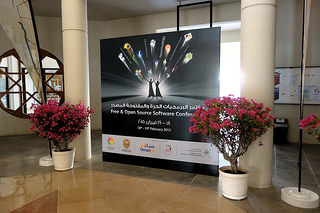
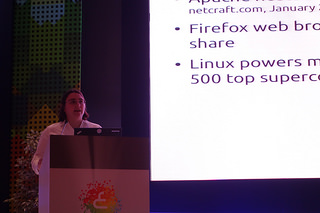
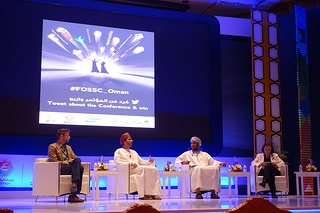
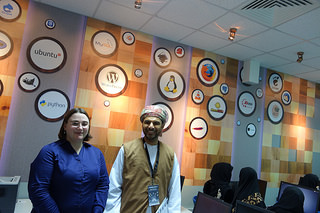
Sunday, Feb 22nd, 2015 at 21:12
Great !! Elizabeth. Thank you and All best.
Sunday, Feb 22nd, 2015 at 21:52
thx Elizabeth for the nice summary about the conference. It is giving a full picture about the overall content of the conference and its side activities. it is a helpful tool specially for those who missed attending it.
Saturday, Feb 28th, 2015 at 5:31
Dear Elizabeth, We are planning an Open Source Summit in UAE this year and would like to know your interests in getting involved. I represent DVCOM Technology, distributor for Digium and Open Source Asterisk in the region. Would appreciate your thoughts on this. Thanks, Deepak
Sunday, Mar 1st, 2015 at 15:14
Deepak – I probably don’t have the budget to attend another middle eastern conference this year, but you’re welcome to email me at lyz@princessleia.com if there’s some way you think I can help.